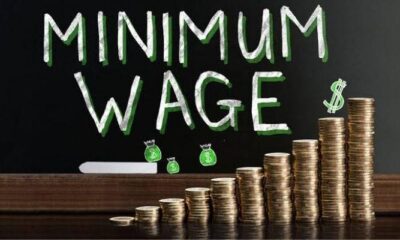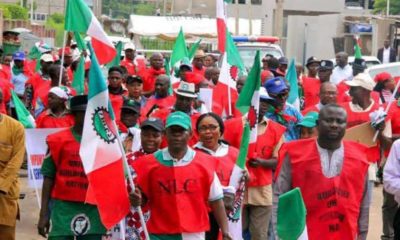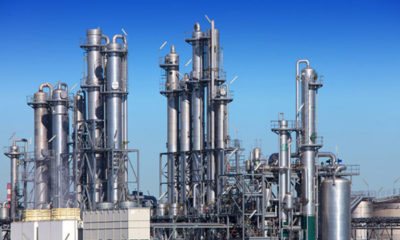Economy
Labour, FG Agree to Suspend Strike for Two Weeks as FG Put Electricity Hike on Hold
Published
5 years agoon

FG Has Put Electricity Hike on Hold for Two Weeks and Announced Palliatives for Workers
The Nigeria Labour Congress and the Trade Union Congress have suspended the strike scheduled to commence today (Monday).
This followed an agreement reached with the Federal Government at a meeting which started at 8.30pm on Sunday and ended at 2:50am this morning.
After exhaustive deliberations on the issues raised by the labour centres, the meeting agreed to suspend the application of the cost-reflective electricity tariff adjustments for two weeks.
The Minister of Labour and Employment, Chris Ngige, read the five-page communique signed by the representatives of the government and labour.
The NLC President, Ayuba Wabba; and his Trade Union Congress counterpart, Quadri Olaleye, amongst others signed on behalf of Organised Labour while the Minister of Labour, Chris Ngige; Minister of State Petroleum, Timipre Silva; Minister of State Labour and Employment, Festus Keyamo (SAN); Minister of Information, Lai Mohammed; and the Secretary to Government of the Federation, Boss Mustapha and others, signed on behalf of the government.
Olaleye confirmed the development in an interview on Monday morning.
He said, “Definitely correct. We just left a press conference. We signed a document to suspend the action for two weeks for the government to implement those things that we agreed in the agreement. So, we are suspending for two weeks.
“We don’t need a notice again to re-convene if there is a need to do that.”
The parties agreed to set up a technical committee comprising Ministries, Departments, Agencies, NLC and TUC.
It would work for a duration of two weeks effective September 28, to examine the justifications for the new policy “in view of the need for the validation of the basis for the new cost-reflective tariff as a result of the conflicting information from the fields which appeared different from the data presented to justify the new policy by NERC; metering deployment, challenges, timeline for massive rollout.”
The members of the committee include the Minister of State Labour and Employment, Festus Keyamo (SAN) as Chairman; Minister of State Power, Godwin Jedy-Agba; Chairman, National Electricity Regulatory Commission, James Momoh; Special Assistant to the President on Infrastructure, Ahmad Zakari as the Secretary.
Other members are Onoho’Omhen Ebhohimhen, Joe Ajaero (NLC), Chris Okonkwo (TUC) and a representative of electricity distribution companies.
The committee’s terms of reference are to examine the justification for the new policy on cost-reflective electricity tariff adjustments; to look at the different DISCOs and their different electricity tariff vis-à-vis NERC order and mandate; examine and advise government on the issues that have hindered the deployment of the 6 million meters, among others.
“During the two weeks, the DISCOs shall suspend the application of the cost-reflective electricity tariff adjustments,” the communique noted.
It also noted that the FG has fashioned out palliatives that would ameliorate the sufferings that Nigerian workers may experience as a result of the hike in cost electricity tariffs and the deregulation of the downstream sector of the petroleum industry.
The palliatives will be in the areas of transport, power, housing, agriculture and humanitarian support.
The meeting also resolved that the 40 per cent stake of government in the DISCO and the stake of workers should be reflected in the composition of the DISCO’s boards.
It agreed that “an all-inclusive and independent review of the power sector operations as provided in the privatization MoU to be undertaken before the end of the year 2020, with labour represented.
“All parties agreed on the urgency for increasing the local refining capacity of the nation to reduce the overdependency on importation of petroleum products to ensure energy security, reduce cost of finished products, increase employment and business opportunities for Nigerians.”
To address this, the parties resolved that the Nigerian National Petroleum Corporation should expedite the rehabilitation of the nation’s four refineries located in Port Harcourt, Warri and Kaduna to achieve 50 per cent completion by December 2021, while timelines and delivery for Warri and Kaduna will be established by the inclusive steering committee.
“To ensure commitment and transparency to the processes and timelines of the rehabilitation exercise, the management of NNPC has offered to integrate the national leadership of the Nigeria Union of Petroleum and Natural Gas Workers and Petroleum and Natural Gas Senior Staff Association into the steering committee already established by the corporation,” the communique stated.
It added that a validation team comprising the representatives of the NNPC, Nigeria Extractive Industries Transparency Initiative, Infrastructure Concession Regulatory Commission, NUPENG and PENGASSAN would be established to monitor progress of the rehabilitation of the refineries and the pipelines/strategic depots network and advice the steering committee periodically.
It also said that post-rehabilitation, NNPC shall involve the PENGASSAN and NUPENG in the process of establishing the operational model of the nation’s refineries.
The statement added, “The Federal Government will facilitate the delivery of licensed modular and regular refineries, involvement of upstream companies in petroleum refining and establishing framework for financing in the downstream sector.
“NNPC to expedite work on the Build, Operate and Transfer framework for the nation’s pipelines and strategic depots network for efficient transportation and distribution of petroleum products to match the delivery timelines of the refineries as agreed.”
The government and its agencies agreed to ensure delivery of 1 million CNG/LPG AutoGas conversion kits, storage skids and dispensing units under the Nigeria Gas Expansion Programme by December 2021 to enable delivery of cheaper transportation and power fuel.
A governance structure that will include representatives of organized labour shall be established for timely delivery.
To cushion the impacts of the downstream sector deregulation and tariffs adjustment in the power sector, the FG agreed to announce in two weeks a specific amount to be accessed by workers with subsequent provision for 240,000 workers under the auspices of NLC and TUC for participation in agricultural ventures through the Central Bank and the Ministry of Agriculture.
The timeline will be fixed at the next meeting.
The meeting further resolved that the FG will facilitate the removal of tax on minimum wage as a way of cushioning the impacts of the policy on the lowest vulnerable.
The government would also make available to organized labour 133 CNG/LPG-driven mass transit buses immediately and provide to the major cities across the country on a scale up basis thereafter, to all states and local governments before December 2021.
“On Housing, 10 per cent to be allocated to Nigerian workers under the ongoing Ministry of Housing and Finance initiative through the NLC and TUC,” the communique disclosed.
Is the CEO and Founder of Investors King Limited. He is a seasoned foreign exchange research analyst and a published author on Yahoo Finance, Business Insider, Nasdaq, Entrepreneur.com, Investorplace, and other prominent platforms. With over two decades of experience in global financial markets, Olukoya is well-recognized in the industry.

You may like
-


Ondo Workers to Receive ₦70,000 Minimum Wage in November Salaries
-


NLC Embarks on Strike Over N75,000 Minimum Wage Offer by Governor
-


Cross River Workers to Begin Indefinite Strike Over Minimum Wage Delay
-


Labour Proposes N497,000 Minimum Wage, Rejects Government’s N57,000 Offer
-


Nigeria Labour Congress and Trade Union Congress Suspend Nationwide Strike Following Government Agreements
-


Port Harcourt Refinery to Begin Production by December 2023 – President Tinubu’s Promise to Labor Unions



